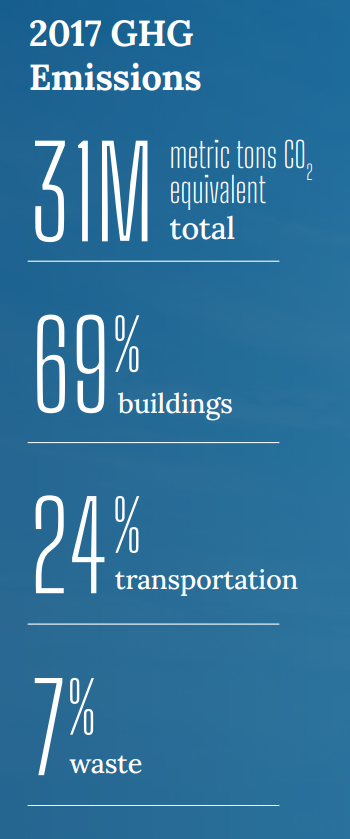Electrify Chicago
An independent tool for viewing City of Chicago building data
According to the
2022 Chicago Climate Action Plan,
69% of Chicago's emissions come from buildings, making
building emissions our biggest challenge and our biggest opportunity as a city
to tackle climate change. At Electrify Chicago, we showcase building performance using
publicly available data supplemented by community-submitted photographs and building
owners.
Start by looking at Chicago's buildings with the highest greenhouse gas intensity i.e. emissions per square foot. Large, efficient, buildings can perform much better than very inefficient small buildings on this metric.
New Article
📰 $30 Million In Missed Fines
The City Of Chicago failed to collect $30 million in potential fines from the building benchmarking ordinance, reducing transparency and accountability.
Legislative update! 🎉
As of late January 2024, legislation is being introduced to require new use more efficient forms of water and space heating, via the Clean And Affordable Buildings Ordinance (CABO), which will reduce the number of highly polluting and inefficient buildings that end up on this site.
If you're in Chicago,
write to your alderman to support the CABO!
Chicago Buildings by Greenhouse Gas Intensity
Note: Data includes large Chicago buildings with data from 2022, unless explicitly stated otherwise.
Note: This data only includes buildings whose emissions are reported
under the
Chicago Energy Benchmarking Ordinance. According to the City “As of 2016,
this list includes all commercial, institutional, and residential buildings larger than
50,000 square feet.” This dataset is also then filtered to only buildings with
reported emissions > 1,000 metric tons CO2 equivalent.
The latest year of data is from 2022, but we update the site regularly when new data is available, and some buildings may have failed to report that year, and only have older data available.
| Property Name / address | Primary Property Type |
Greenhouse Gas Intensity (kg CO2 eq./sqft) |
Total Greenhouse Emissions (metric tons CO2 eq.) |
|---|---|---|---|
|
5301 5331 S KIMBARK AVE
🏆
5301 5331 S KIMBARK AVE
| Multifamily Housing | 5.9 kg/sqft
Lowest 40%
| 354 tons
Lowest 13%
|
|
Union Health Service
🕰️
1634 W Polk St
| Medical Office | 5.9 kg/sqft | 299 tons |
|
224 North Desplaines
🕰️
224 N Desplaines St
| Office | 5.9 kg/sqft | 457 tons |
|
Evergreen Tower II
1343 N CLEVELAND AVE
| Multifamily Housing | 5.9 kg/sqft
Lowest 40%
| 557 tons
Lowest 31%
|
|
331 S PEORIA ST
331 S PEORIA ST
| Multifamily Housing | 5.9 kg/sqft
Lowest 40%
| 338 tons
Lowest 11%
|
|
1515 N ASTOR ST
1515 N ASTOR ST
| Multifamily Housing | 5.9 kg/sqft
Lowest 40%
| 634 tons
Lowest 36%
|
|
5918 N KENMORE AVE
5918 N KENMORE AVE
| Multifamily Housing | 5.9 kg/sqft
Lowest 40%
| 364 tons
Lowest 14%
|
|
3470 N LAKE SHORE DR
3470 N LAKE SHORE DR
| Multifamily Housing | 5.9 kg/sqft
Lowest 40%
| 779 tons
Lowest 45%
|
|
3963 W BELMONT AVE
3963 W BELMONT AVE
| Multifamily Housing | 5.9 kg/sqft
Lowest 40%
| 1,479 tons
Highest 32%
|
|
2828 N PINE GROVE AVE
2828 N PINE GROVE AVE
| Multifamily Housing | 5.9 kg/sqft
Lowest 40%
| 575 tons
Lowest 32%
|
|
5220 5224 N KENMORE AVE
5220 5224 N KENMORE AVE
| Multifamily Housing | 5.9 kg/sqft
Lowest 40%
| 300 tons
Lowest 8%
|
|
2018 2040 W FARWELL AVE
🕰️
2018 2040 W FARWELL AVE
| Multifamily Housing | 5.9 kg/sqft | 351 tons |
|
Old Chicago Main Post Office
🚩
404 W HARRISON ST
| Office | 5.9 kg/sqft
Lowest 40%
| 14,703 tons #34 Highest
|
|
150 N RIVERSIDE PLAZA
150 N RIVERSIDE PLAZA
| Office | 5.9 kg/sqft
Lowest 40%
| 8,738 tons
Highest 3%
|
|
5825 S DORCHESTER AVE
5825 S DORCHESTER AVE
| Multifamily Housing | 5.9 kg/sqft
Lowest 40%
| 484 tons
Lowest 25%
|
Data Source:
Chicago Energy Benchmarking Data
